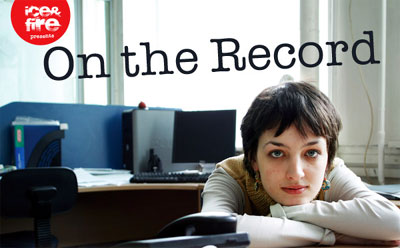The true stories of journalists from Mexico, Sri Lanka, Russia, the United States, and the Occupied Palestinian Territories will hit the stage July 20 at London’s Arcola Theatre. “On the Record,” which runs through August 13, examines the careers of six journalists, the risks they face, and their determination to make an impact through their work. This is the latest production by the UK-based Ice and Fire theater company, founded in 2003 to explore human rights stories through performance. Christine Bacon, Ice and Fire’s artistic director and co-author of “On the Record,” discusses the production’s inspiration, messages, and challenges in this CPJ interview.
EW: What inspired you to write “On the Record”?
CB: As a human rights-focused group, we often listen to “Democracy Now!” I was surprised that we weren’t hearing this level of analysis and information anywhere else. We started getting interested in some of the journalists they featured and wanted to explore through theater, the medium we know best, what makes good journalism, which is a crucial function of our society.
EW: “On the Record” features six journalists: Mexican journalist Lydia Cacho, brothers Lal and Lasantha Wickramatunga in Sri Lanka, Russian investigative reporter Elena Kostyuchenko, U.S. photojournalist Zoriah Miller and Israeli journalist Amira Hass, who lives and reports from Occupied Palestine. How did you select these journalists?
CB: We started to look at people who have taken a stand in their journalism. For example, Lydia Cacho stood up to crime and corruption; Zoriah took a stand against military censorship. Amira Haas is the only Jewish Israeli reporter living in Occupied Palestine . In most of these cases, these journalists have experienced some dramatic event because of their work. In the context of a play, we wanted stories that would take the audience on a journey.
EW: What approach did you take to bringing their stories to the stage?
CB: We interviewed the journalists; we used raw material, and public materials on the record. It’s taken a couple of years to get it from idea to stage. We’ve tried to avoid a narrative structure where one person does one story and then another. We found there were some echoes from one story to another and we wanted to show that. These people may be working under different governments and from very different backgrounds, but common messages emerge.
EW: What are some of those messages?
CB: The strongest one is that what journalism often seems to do is follow what everyone else thinks is important instead of following their instincts for getting to the heart of the story.
EW: Many of these journalists have and are taking extraordinary risks. For example, five of Elena’s colleagues from Novaya Gazeta newspaper have been murdered in connection to their work. What did you find motivates them?
CB: Everyone has very different reasons for doing journalism, but they all seem to be motivated by a desire to shed light on dark places–to go after stories that just aren’t covered. Elena, who was 21 when she was interviewed, said she was inspired by Anna Politkovskaya to start working as a journalist. She is a new generation of journalists who are not silenced by the culture.
When Elena gave a tour of her office, she said, “We work in a place where every 2-3 years someone is killed. You can’t help but think about it some days – wondering who’s next.” But what comes through strongly is that these acts [of violence] are not deterring people. There is a feeling that even though they have killed, they haven’t won because we are still doing this. And there is a sense of camaraderie.
For Lal to keep publishing The Sunday Leader after his brother’s Lasantha’s murder wasn’t even a difficult choice. He believes if we don’t give up, then at least none of it is in vain.
EW: What were some of the challenges in developing this production?
CB: You could have written a play about each one of them because they are such interesting characters. So the challenge was to convey their essence and sift through the mountain of material. You wonder: Can one-fifth of a play of a play really tell their story? The biggest challenge, though, was trying to find funding for the production.
EW: Several of the journalists featured in the play have been profiled by news media and human rights groups. What do you think are the benefits of bringing their stories to the stage?
CB: What theater does with most stories is allow you into the stories. It allows you a level of empathy that other mediums don’t. With theater you can go on a journey. Bringing them together on stage tells a story about journalism – what good journalism is and understanding how important it is to every society.
For more about “On the Record”and ticket information visit Ice and Fire’s website.
